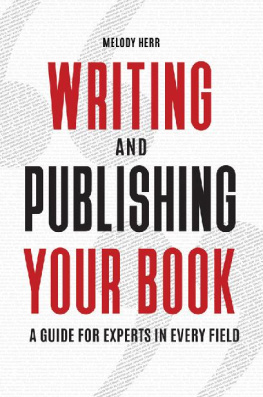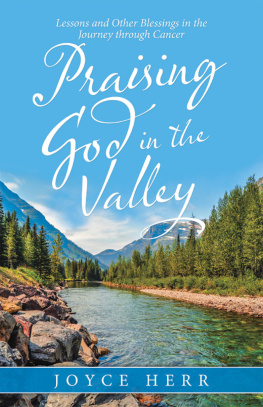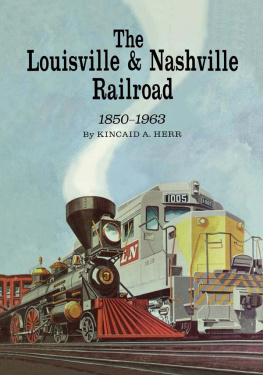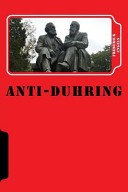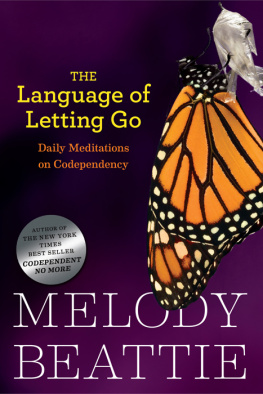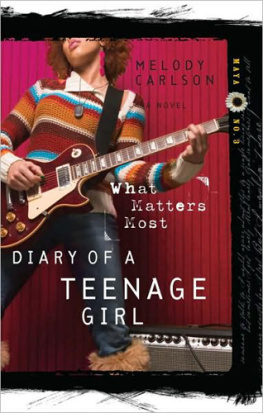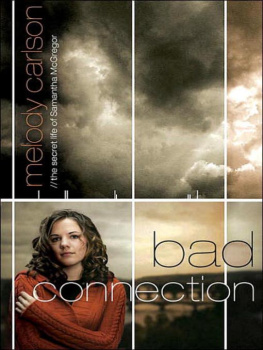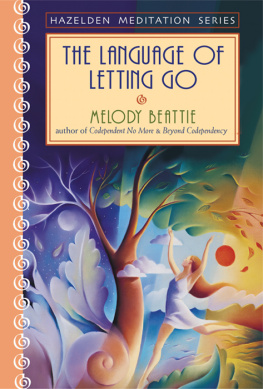Writing and Publishing Your Book
A Guide for Experts in Every Field
Melody Herr
Copyright 2017 by Melody Herr
All rights reserved. No part of this publication may be reproduced, stored in a retrieval system, or transmitted, in any form or by any means, electronic, mechanical, photocopying, recording, or otherwise, except for the inclusion of brief quotations in a review, without prior permission in writing from the publisher.
Library of Congress Cataloging-in-Publication Data
Names: Herr, Melody, author.
Title: Writing and publishing your book : a guide for experts in every field / Melody Herr.
Description: First edition. | Santa Barbara, California : Greenwood, [2017] | Includes bibliographical references and index.
Identifiers: LCCN 2017024019 (print) | LCCN 2017043402 (ebook) | ISBN 9781440858758 (hardcover : alk. paper) | ISBN 9781440859021 (softcover : alk. paper) | ISBN 9781440858765 (ebook)
Subjects: LCSH: Authorship. | Academic writing. | AuthorshipMarketing. | Scholarly publishing. | Authors and publishers.
Classification: LCC PN146 (ebook) | LCC PN146 .H38 2017 (print) | DDC 808.02dc23
LC record available at https://lccn.loc.gov/2017024019
ISBN: 978-1-4408-5875-8 (hardcover)
978-1-4408-5902-1 (paperback)
978-1-4408-5876-5 (ebook)
21 20 19 18 17 1 2 3 4 5
This book is also available as an eBook.
Greenwood
An Imprint of ABC-CLIO, LLC
ABC-CLIO, LLC
130 Cremona Drive, P.O. Box 1911
Santa Barbara, California 93116-1911
www.abc-clio.com
This book is printed on acid-free paper

Manufactured in the United States of America
Contents
Introduction: Introducing the Expert
Experts like you are the reason I started reading serious books. As a teenager, I discovered the thrill of engaging on the page with experts who introduced me to Catherine the Great, explained chimpanzee behavior, and recounted the discovery of the double helix.
Experts like you are the reason I went to graduate school. As a college student, I relished conversations with Frank Bremer, the biographer of John Winthrop, and Steve Centola, the Arthur Miller scholar. When historian John Hope Franklin and paleoanthropologist Richard Leakey gave guest lectures, I arrived at the auditorium before the doors opened. Inspired by these face-to-face encounters, I applied to graduate school with the intention of becoming an expert and writing important books myself.
Experts like you are the reason I chose this career path. By the time I earned a PhD, I knew I couldnt write all the books that I believe really must be written. But as an acquisitions editor, I could assist other experts. For more than 16 years, I worked for a number of university presses, including Johns Hopkins and the University of Michigan. During that time, I published over 250 books in collaboration with authors in fields ranging from business history and U.S. history to law, political science, and international relations. Building on this experience, I moved into scholarly communications, an emerging profession that encompasses the economic, ethical, legal, and functional aspects of todays diverse, complex systems for disseminating research and scholarship. In this role, I help authors navigate these systems and make informed choices.
You are the reason I wrote this guide. Youve invested years of study, research, and lived experience in becoming an expert. You know your topic, inside and out. However, writing and publishing a book require another layer of expertise, and that expertise is precisely what I offer. In the following pages, I show you how to construct a table of contents, prepare a proposal, identify a publisher, manage peer review, negotiate a contract, draft your manuscript, and market your book. In each chapter, I introduce the tried-and-true strategies that I developed through coaching hundreds of authors. These practical, step-by-step instructions will liberate your own creativity and keep you moving forward, efficiently and confidently.
Although I organized this guide from initial plan to final publication, it isnt necessary to read the entire guide before beginning your project. Maybe youre negotiating a contract or struggling through the first draft of your manuscript. Go ahead; jump straight to the relevant chapters. If you are just beginning, youll benefit most from this guide if you read through it quickly to get an overview of the entire process and then work through the chapters one by one.
In , the authorpublisher relationship is a business partnership; you want to choose your partner with care. I enable you to evaluate potential publishers on the basis of their reputation in your discipline, the quality of their publications, and the level of service they provide both to authors and to customers.
After youve drawn up your short list, in , I walk you through the publishing contract, clause by clause, and explain the responsibilities of each party in this business partnership: the publisher and you, the author.
In the next two chapters, I teach you techniques for engaging readers even while you present them with complex, challenging material. In addition to these writing tips, I offer suggestions for using quotations, illustrations, graphs, and tables to maximize their impact as evidence for your argument. When you finish the manuscript, I help you prepare it for submission in by explaining the components of a scholarly book and their arrangement. In the final chapter, I describe the publication process and give you a few pointers for collaborating with your publishing team.
Also in the final chapter, I show you how to launch a marketing campaign for your book. I help you to target the right audiences, with the right message, through the right media. Through your marketing campaign, you not only promote your book but also advance your career by spreading the word that you are the expert on your topic.
However you choose to use this guide, youll find here the most essential information and the most effective strategies for writing and publishing your book.
ACKNOWLEDGMENTS
I want to thank the Greenwood team and, especially, Jessica Gribble for partnering with me to publish this book. Thank you also to the colleagues and authors who have worked with me and taught me so much. I look forward to future collaboration!
CHAPTER 1
Developing Your Project: The Criteria for a Book
Youre making a name for yourself. Youve won the recognition of colleagues at your institution and peers in your field. Now youre ready to solidify your authority and extend your domain. In combination with your other professional achievements, a book can be a highly effective means of establishing yourself as the go-to expert on your topic. In this chapter, I briefly compare a book to other venues for publicizing research and scholarship so that you can determine if a book will serve your purpose. I then discuss the four criteria for evaluating a potential book project: methods, evidence, scope, and context.
A BOOK IN THE INFORMATION MARKETPLACE
Pause for a moment and consider your own behavior as an information consumer. You seek information for answering a factual question, teaching a class, entertaining yourself during a dull moment, learning more about your research topic, and investigating larger questions in your field. News reports, journal articles, books, blogs, conferences, lectures, websites of professional societies, colleagues down the hallall these are sources that you use at one time or another. How do your purpose and the nature of the information correlate with the source you choose?



